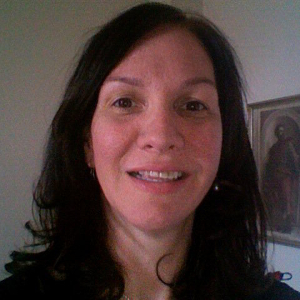
A piece from 31 Days of Urban Agriculture by Lindsay Curren.
Peak oil commentator of Archdruid fame John Michael Greer, who foresees an inevitable if gradual collapse for industrial society, advises the equally doomstruck to “collapse now and avoid the rush.”
It’s good advice and I’ve taken it to heart.
Transition girl
About six years ago I moved to the small (but widely-hailed) city of Staunton, Virginia. Shortly afterwards, I helped start our Transition town here.
Say what you will about whether anybody’s personal efforts — from carrying your own bags to driving less to raising chickens — makes a damn bit of difference in a world hurtling toward climate hell and energy crisis, but I remain in the camp that would rather being doing something positive that builds resilience and community than helplessly awaiting the end.
And while I understand why some people become survivalists, since I live in town, hunkering down behind an AK47 in the basement, clinging to my cans of beans and freaking out over a would-be zombie apocalypse is not really an option.
That’s why I prefer the approach of Transition.
In the spirit of the old saying that “My meat is in my brother’s belly,” I’m trying to prepare my household for tough times ahead by working with my neighbors to make my whole town more resilient.
So, I’ve become a local resilience activist through our local Transition group. We’ve hosted talks on Transition issues, including peak oil, climate change and economic chaos. We’ve shown films on everything from bee keeping to starting beer businesses. And we’ve built the largest community garden in our city.
And transitioning others
With all modesty, I’d say that so far, it seems to be paying off. In lots of ways Staunton is a Transition town in the best sense of the concept — interesting people have been attracted to the area who are doing their own things with transitioning, even when that’s with a small “t” and those people aren’t directly part of our group and their work is with some other group in town, whether the Rotary Club or the microloan fund.
These other groups are behind great stuff — time banks, little libraries, mending circles, writing groups, art happenings, bike fix-it days, bike infrastructure groups, eco-swaps, maker spaces. As one friend quoted another Staunton resident recently, “It’s not like being in New York, but it is like living in a New York neighborhood.”
Okay, we’re not Manhattan…or Brooklyn, but I’d put our small city against anyplace in America for resilience cool.
And the longer I live here the more I’m taking Greer’s advice to heart. The weird thing is, collapse sure does feel a lot like the good life!
It’s definitely fun to walk the resilience talk.
Chop wood, carry water
But it’s also serious, preparing us for an economy that’s sure to be much lower-tech in the future as cheap energy runs out. Whether it gets down to what James Howard Kunstler would call a “world made by hand” I’m not sure. But we should certainly be prepared for big changes in how we get our daily necessities. That’ll mean not just gardening and preserving food, but also mending clothes and making handmade Christmas gifts.
I’ve also recently launched an art project called 31 Days of Urban Agriculture to recognize and celebrate the unique world of food and farming in cities, the way it’s always been done. I’m doing this 31-piece series in linoleum block prints in honor of the Virginia General Assembly declaring October Urban Agriculture Month. Who knows, maybe they’re secretly preparing for collapse, too? 
Each hand-cut piece takes me about 15 hours to produce from design to print. I chose this labor-intensive, old-timey medium to reflect the realities in small-scale food and farming — that they’re processes that take time and face risks. Just as harvests can differ from year to year, so hand-made prints can differ from block to block.
I hope you’ll check out 31 Days of Urban Agriculture. It’s also a project on Kickstarter.com because I want to raise money to display it attractively and show it around the state and beyond. That’ll require putting a complete set of prints in high-quality frames, making a chapbook of essays to go along with the show, and then donating a full set of the prints to the Commonwealth of Virginia.
The project is about using art to get more people excited about growing food in cities, where 80% of Americans live today. And ultimately, that’ll help spread the word on just how inspiring, reviving and hopeful collapse Transition, can be.
— Lindsay Curren, Transition Voice






